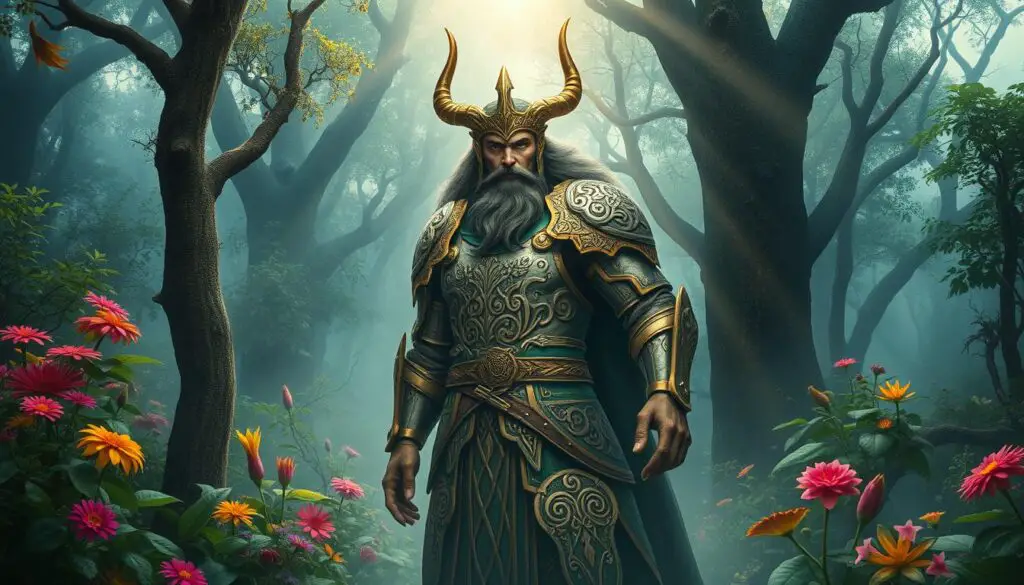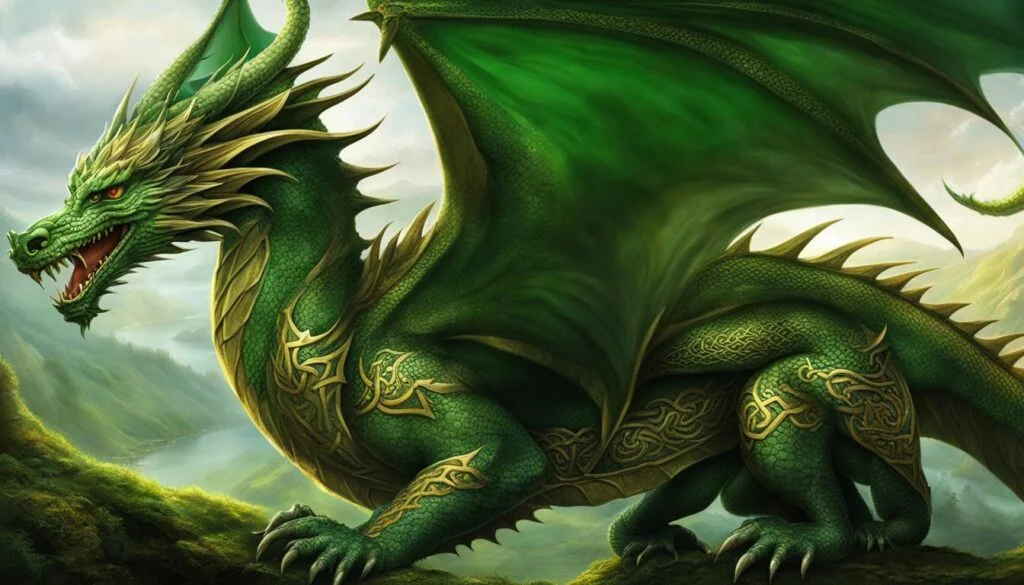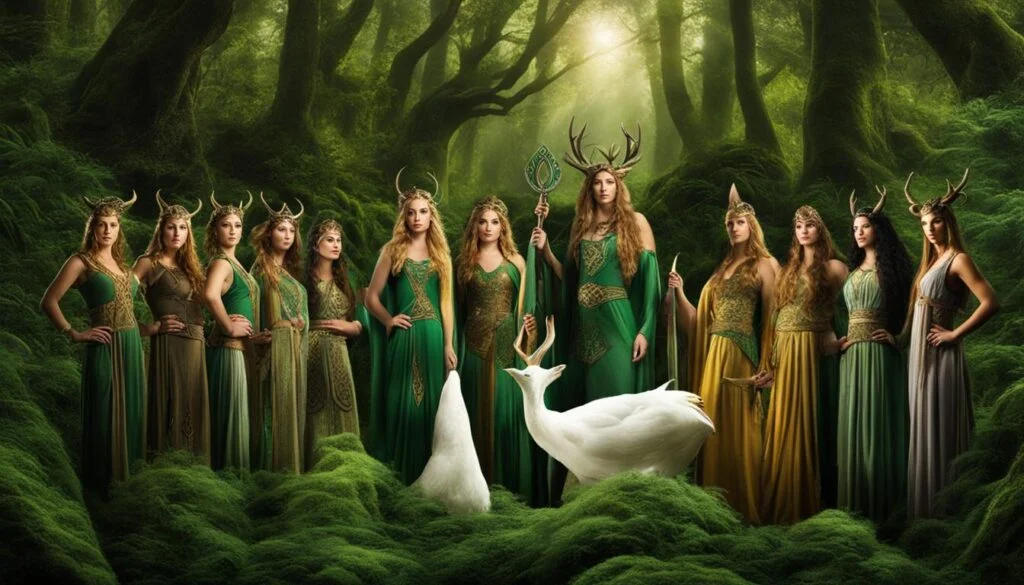Bres is a captivating yet complex character in Celtic myths. He stands out in Irish stories, different from the honored gods.
Bres didn’t get the love usually given to a Celtic god, though he comes from the Fomorian people.
His story weaves together godly heritage and human mistakes. It shows the rich layers of mythological beings.
Bres’ dad could be Elatha or Balor, important figures in these myths.
But Bres didn’t get their strong qualities. His beauty couldn’t hide his flaws.
When he led the Tuatha de Danann, his rules hurt many. His story touches on power, failure, and human nature.
Let’s dive into Bres’ tale and see what it teaches us.
Key Takeaways
- Bres’ story highlights intricate and nuanced mythological characters in Celtic lore.
- Bres is depicted more as a mortal than a revered Celtic god due to his flawed reign.
- As a ruler, Bres imposed heavy taxes and commanded menial tasks from the deities.
- The relationship between Bres and Brigid, daughter of the Dagda, is significant in Irish mythology.
- Bres’ reign ended in discontent and eventual exile, emphasizing themes of power and downfall.
Introduction to Bres in Celtic Mythology
Bres is a key character in Celtic mythology. He is known for his mixed origins.
His family background makes him very special in Irish stories.
The Fomorians: Bres’ Ancestry
Bres comes from an interesting family. His dad, Elatha, was a famous Fomorian prince.
His mom, Ériu, was important among the Tuatha de Danann. This mix made Bres unique and accepted as a leader.
The Fomorians play a big part in stories about Bres. These beings came to Ireland before humans did, as old tales say.
Bres’ story is deeply linked with his ancestors.
Why Bres is Considered a Celtic Deity
Bres is seen as a god because of a few reasons. His mix of royal and supernatural roots makes him special.
He is often compared to gods from other cultures.
For example, just as Alator is similar to Mars, and Belenus is like Apollo, Bres is compared to Olympic gods and Aesir.
His rule shows he was powerful in the Tuatha de Danann world.
His looks and his part in big battles also made people respect him. But, he was also a figure of debate in the stories about him.
The Rise of Bres: His Path to Kingship

Bres’ rise was key in the Tuatha Dé Danann’s history. After King Nuada lost his arm, they needed a new leader.
They liked Bres for his family background and his looks.
Tuatha de Danann’s Decision
The Tuatha Dé Danann had high standards. Choosing Bres as king was a big deal for them.
They thought Bres could bring peace. He was part Tuatha Dé Danann and part Fomorian.
His selection showed they valued unity and harmony. It also showed they liked leaders who looked perfect.
Bres’ Physical Perfections
Bres looked perfect, which helped him become king. In their society, good looks meant you were favored by the gods.
Bres’ good looks made him an ideal leader. But his time as king showed looks aren’t everything.
Bres and His Rule Over the Tuatha de Danann
Bres was a king who did not treat his people well. He made the Tuatha de Danann pay a lot of tributes.
Important people like Dagda had to do lowly tasks.
Oppressive Reign and Policies
Bres was very hard on his people. He made the Tuatha de Danann work a lot and pay high taxes.
Everyone hated his rules, making him known as a mean king. He forced the warriors to do simple work and give goods to keep his palace fancy.
Impact on the People and the Tuatha de Danann
Bres’ rule hurt the Tuatha de Danann a lot. They were once a proud and magical race.
But under Bres, they suffered and were very unhappy. This suffering made them want to fight back.
Their anger against Bres grew, leading to plans to remove him. They hoped for a better king to come.
Bres’ Relationships and Family Ties
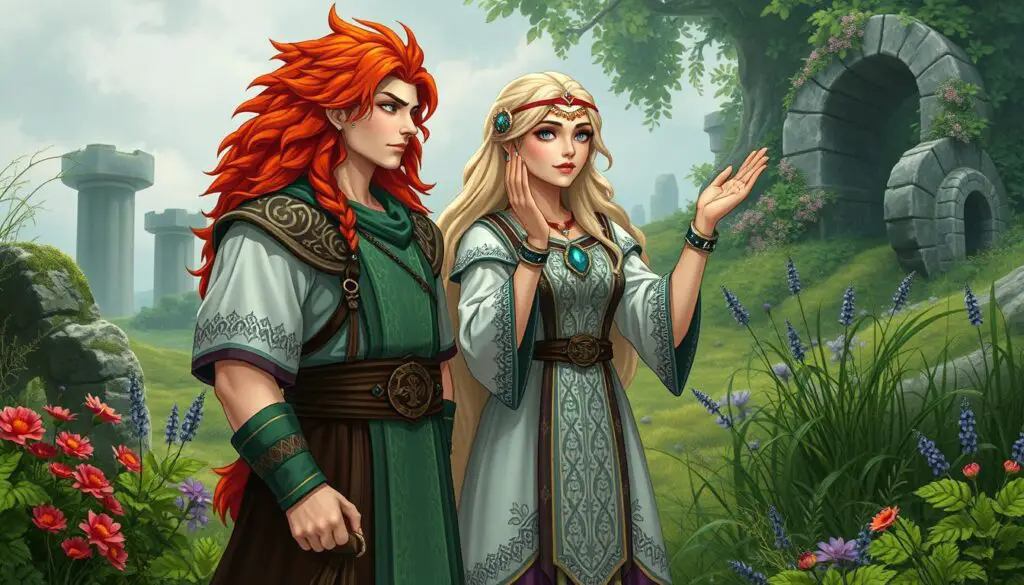
The story of Bres, a Celtic god, involves magical family connections.
His marriage to Brig is fascinating. Brig is a goddess linked to poetry, healing, and more.
This love story is part of a huge web of myths about the Tuatha de Danann. It also shows how important gods were in Irish stories.
Bres and Brig: A Mythical Pairing
Bres and Brig were an important couple in Celtic stories.
Brig was known for three main things: poetry, healing, and blacksmithing. She married Bres, who was part king, part god.
Even though Bres was not a good king, their son Ruadan became very important.
Connections to Key Figures in Irish Mythology
Bres and Brig were connected to other big names in Irish myths.
Brig was powerful and respected. She was married to Dagda, a god of farming and magic.
Their marriage mixed different godly powers together. This mix appears in many Celtic stories.
Ruadan, their son, also played a big role. He continued the story of his godly parents.
This shows how important Bres and Brig were. They added a lot to the stories of gods like Dagda and made Brig’s roles stand out.
The Downfall of King Bres
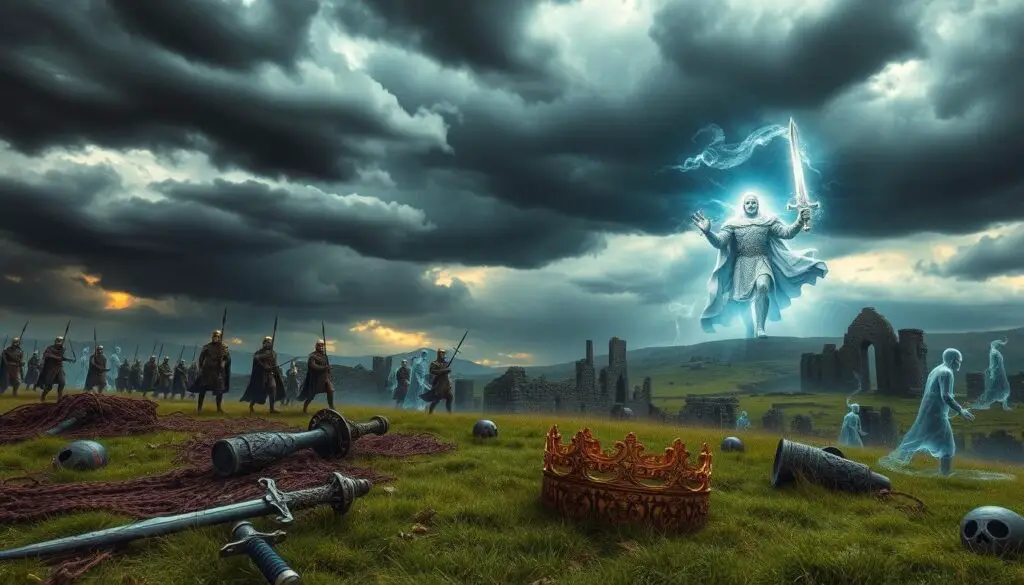
Bres was a king of the Tuatha de Danann. His story is a tale of quick rise and fall.
He was half-Fomor, half-Dé Danann and ruled for just seven years. His harsh rule did not last long.
Role of Poets and Prophecies
A poet’s curse led to Bres’ fall. Cairpre, the Tuatha Dé Danann bard, spoke out against Bres.
His words about Bres’ unfairness made people dislike the king. Because words were very powerful, they helped make Bres unpopular.
Bres also made people pay high taxes. He did not treat everyone fairly.
This made even more people turn against him.
Nuada’s Return and Bres’ Exile
Nuada coming back changed everything for the Tuatha Dé Danann.
He fought back with great courage after being healed by Miach. Nuada won a big battle against Balor.
This victory ended Bres’ rule.
Nuada’s victory forced Bres to leave. His time as a king ended disastrously.
A cursed tune and a heroic return changed Celtic tales forever.
Bres vs. Nuada: The Battle for Kingship
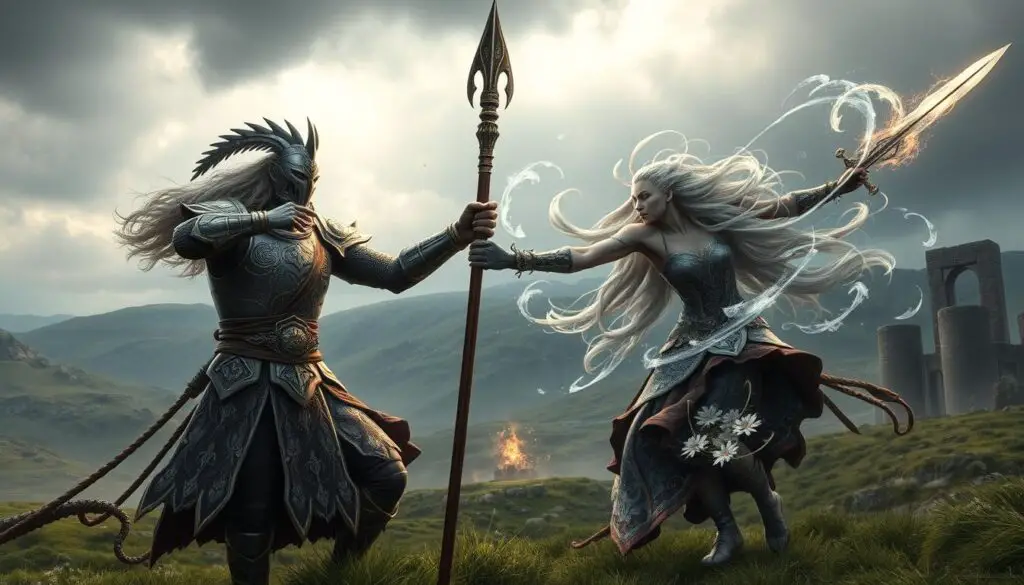
The battle for the Tuatha de Danann kingship was fierce. It was mainly because of the rivalry between Bres and Nuada.
Nuada was the first king. He lost his arm in a fight. This meant he couldn’t be king anymore.
Nuada’s Handicap and Bres’ Rise
Nuada’s injury led to Bres becoming king. His rule began because the Tuatha de Danann wanted a king without flaws.
But Bres was tough on his people. His strict rules made many unhappy. This time was full of changes and challenges.
- Nuada’s handicap led to Bres being named king.
- Bres’ reign lasted for seven years before his exile.
The Confrontation and Outcome
Nuada and Bres finally clashed in battle. Nuada got a silver arm and became king again.
He ruled for twenty more years. But Bres tried to take back his throne. His ally was the powerful Fomorian, Balor.
Their struggle led to another big fight. Nuada’s side won, but he lost his life. Balor also fell, thanks to Lugh.
- Nuada’s return to power after getting a silver arm.
- Bres’ attempt to reclaim the throne, supported by Balor.
- The Second Battle of Magh Tuiredh resulted in Nuada’s death and defeat of Bres’ forces.
Symbolism and Legacy of Bres
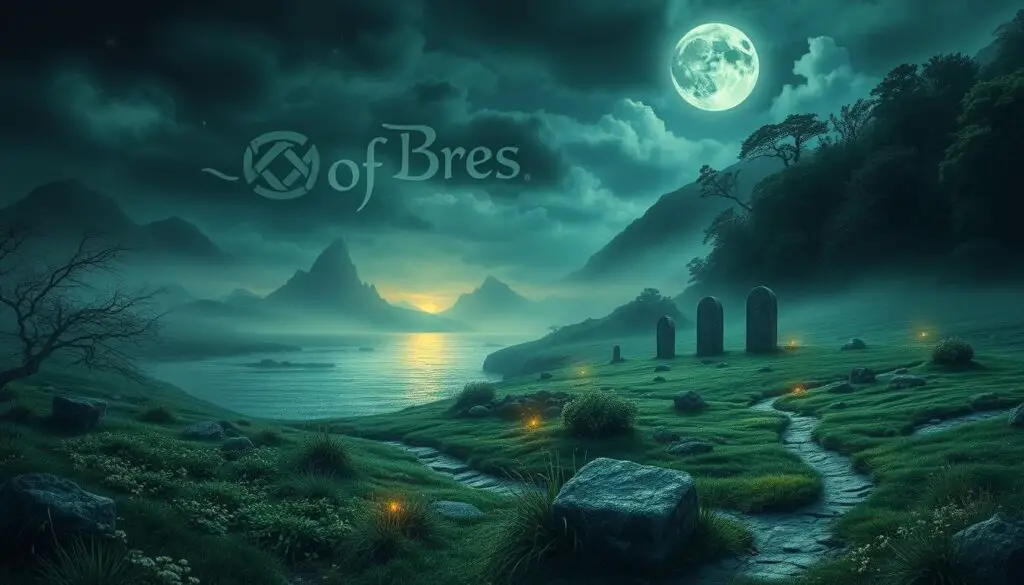
Bres’ place in Celtic myths is full of symbols. He shows us wisdom and tyranny.
His story is a lesson on good rule versus harsh control.
Bres was seen as perfect in looks, showing what kings should be like.
But his cruel rule showed looks aren’t everything. It’s a lesson on valuing what’s inside over appearance.
Bres linked two warring groups, showing how culture can blend but also clash.
His story reflects the complex relations and outcomes of leadership gone wrong.
Druids kept Bres’ story alive. They were judges, poets, and priests.
By telling his tales, they taught important lessons.
Druids also connected with symbols in nature, adding mystery to Bres’ tale.
Ogham script, thought to be made by Ogma, kept these stories alive. These writings show how myths shape Ireland’s culture.
Looking at Bres, we see the deep meanings in Celtic myths.
His tale teaches us about leadership and its effects on society. It shows how important myths are in holding a culture’s values.
Bres in Irish Folklore
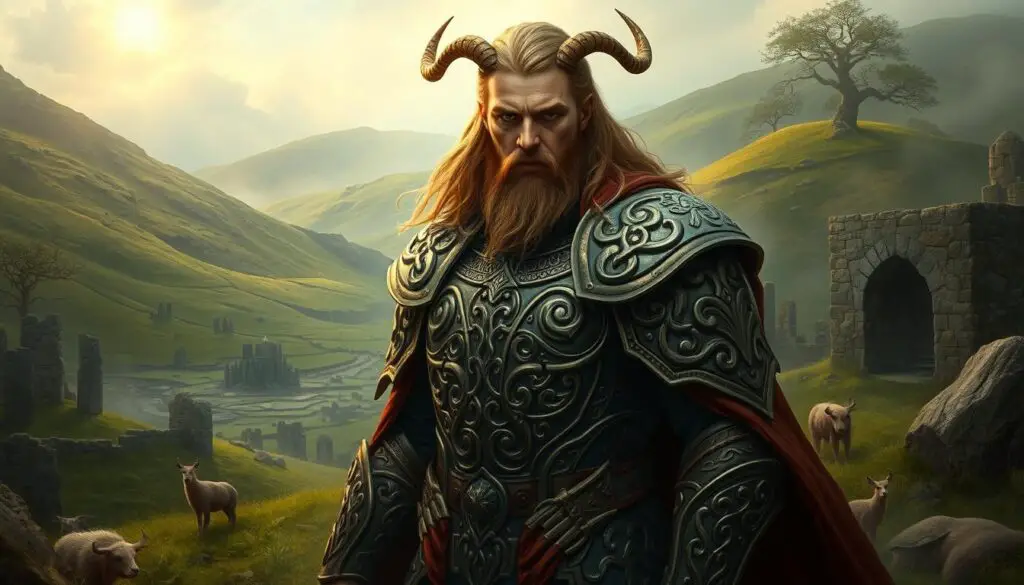
Bres is known for his beauty in Ireland. He is seen as very beautiful.
His story is full of oral traditions and shows how celtic myth influence shapes his image.
Portrayal in Oral Traditions
Bres’ story comes alive through oral traditions. His life combines Tuatha Dé Danann and Fomori heritage.
Oral traditions tell of his mixed parentage. His dad was a Fomorii king, his mom a goddess.
These tales show his rule’s two sides.
Stories focus on his unfair rule at first. He taxed the Tuatha Dé Danann a lot.
He also took their food. A poet named Coirpre critiqued Bres for not caring for his people.
This shows how oral traditions keep leaders accountable.
Influence on Modern Literature and Media
Today, Bres’ story influences books and media. His complicated life and judgement attract attention.
He’s viewed in new ways, from books to TV. His story shows the impact of celtic myth influence.
Experts like Barry Cunliffe, Peter Berresford Ellis, and Dr. Dáithí OhOgáin study Bres a lot.
They help keep his story alive today. Bres stands out in Celtic myths. He mixes beauty with harsh rule, showing complex themes in myths and culture.
Exploring Bres’ Origins
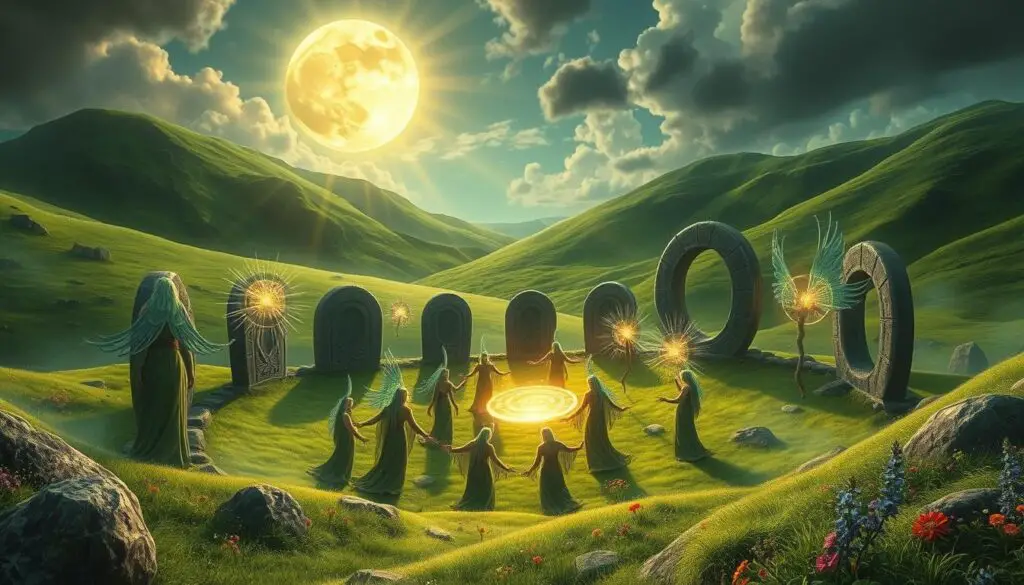
Bres’ story in Celtic myths is fascinating. He comes from two different worlds.
As a child of a Fomorian king and a goddess, Bres is special. This mix shapes him and his actions in the stories.
Parentage and Mixed Heritage
Bres’ background is really interesting. His dad, Elatha, was a big king with wild power.
His mom was a goddess who brought peace and life. This mix made Bres very special.
Elatha gave Bres strength and power. But his mom gave him kindness and beauty.
This is why he was called “Bres the Beautiful.”
Theories and Speculations
People love to guess about Bres’ story. Some think his two sides show a battle between good and bad.
Others say his tough time as king shows the hard job of mixing two worlds.
Others think about why Bres made tough rules. They wonder if it was hard for him to fit in.
His story is great for learning about myths and what they mean.
Bres’ Lasting Impact on Celtic Mythology
Bres is very important in Celtic stories because he shows both beauty and bad leadership.
His story makes him an important and complex figure in Celtic myths.
Bres is shown as the son of the beautiful Elatha in ancient poems.
This shows his high birth and big role. He is seen as kind, with verses like “a hundred liquid measures for every rooftree” showing his generosity.
His story tells of his good looks, short good times, and sad fall.
His tale shows fights between mythical groups, revealing complex relationships.
Being half-Fomorian, Bres’ story highlights the impact of marriages and alliances in myths.
Bres’ story teaches about leadership and the effects of not following rules.
It talks about his failure to resist temptations and what that led to.
This shows Bres not just as pretty but as a lesson in ancient tales.
The stories also show old Celtic customs and leadership.
They mention tributes, like “three hundred bitter-hard pints,” telling us about old Celtic ways. Bres’ rise and fall add much to the cultural stories, showing his big impact.
As a Celtic god, Bres is very important and interesting to many. His story is a key part of Irish myths.
It shows the mix of beauty, kindness, and the fall from bad leadership. Bres’ legacy remains strong in Celtic stories, keeping his memory alive for many years.
Comparative Analysis: Bres and Other Deities
When looking at Bres and other gods, we see some patterns.
Through comparative mythology, Bres is compared to gods from different backgrounds. This shows what’s unique and common among them.
The stories of the Partholonians and their fights with the Fomorians are similar to Bres’ story.
It’s about the constant battle between chaos and order. Bres links the Tuatha de Danann and the Fomorians.
This is like the Greek gods fighting the Titans.
Bres’ mixed heritage connects him to both the Tuatha de Danann and the Fomorians.
This is much like Hercules, who had a god for a father and a human for a mother. Both heroes had special strengths and weaknesses.
Bres’ rule and fall remind us of other myths with bad kings.
For example, Loki in Norse mythology. He rose to power, was betrayed, and then exiled. Loki’s story is a lot like Bres’.
The stories also show Bres as a god of fertility and a king. This dual role is seen in other cultures too.
Like Osiris in Egyptian tales, he ruled over fertility and the underworld. This shows Bres’ complex character is not unique.
In the end, studying comparative mythology helps us see Bres’ role in broader mythology and his special place in Celtic stories.
Looking at Bres and other gods helps us understand common human themes in these ancient tales.
Conclusion
Bres’ tale is a deep dive into Celtic myths. It’s a story of leadership, family roots, and losing power.
He became a king because of his unique family. He was part Fomorian and part Tuatha de Danann.
This made his role as king very challenging.
His time as a king was tough. He was not kind to his people.
This led to unhappiness and eventually, his fall from power. He had to leave his kingdom.
Looking at Bres’ family and friends shows how everyone in Irish myths is connected.
His marriage to Brig and other alliances are key. They show how everyone’s stories are intertwined. This highlights Bres’ important place in these myths.
Bres’ story is about more than power. It’s about where we come from and who we are.
It affects stories all over the world, not just Irish ones. His story is important for understanding culture.
It makes us think and learn. Bres’ story is very meaningful and keeps us interested.
Frequently Asked Questions
Q: Why was Bres considered a bad king?
Bres was considered a bad king in Celtic mythology because his rule was marked by greed and tyranny. He imposed harsh taxes, favored his own Fomorian kin over the Tuatha Dé Danann, and neglected the prosperity and welfare of his subjects, leading to widespread discontent.
Q: Why is Bres the Beautiful cursed?
Bres the Beautiful was cursed because of his failure to fulfill the duties of kingship honorably in Celtic mythology. His miserliness and the dishonor he brought upon the Tuatha Dé Danann led to his downfall and eventual curse, forcing him into exile.
Q: Who is the trickster god of Celtic?
The trickster god of Celtic mythology is often considered to be Lugh, known for his cleverness and skill in multiple crafts. Lugh uses his wits and intelligence to overcome obstacles, often in a cunning or deceptive manner.
Q: Who is the warrior goddess Celtic?
The warrior goddess in Celtic mythology commonly refers to Morrigan, who is associated with war and fate. She is known for her ability to influence the outcome of battles, often appearing as a crow or raven over the battlefield.
Q: What is the story of Bres?
Bres, a figure from Celtic mythology, was a king of the Tuatha Dé Danann who was known for his beautiful appearance but poor leadership. His reign led to hardship among the gods, and after being deposed, he sought assistance from the Fomorians to reclaim his throne, culminating in the epic battle of Mag Tuired.
Q: What is the prophecy of the Tuatha de Danann?
The prophecy of the Tuatha Dé Danann, as recounted in Celtic mythology, foretells their eventual defeat at the hands of mortal men, leading to their retreat into the Otherworld. Here, they continue to interact with the mortal realm but as diminished deities or fairy folk.
Q: Who was Dagda?
Dagda is one of the principal gods of Celtic mythology, known as the “Good God” because of his benevolence. He is a figure of immense power, associated with life, death, knowledge, abundance, and protection, wielding a club that could kill with one end and bring to life with the other.


